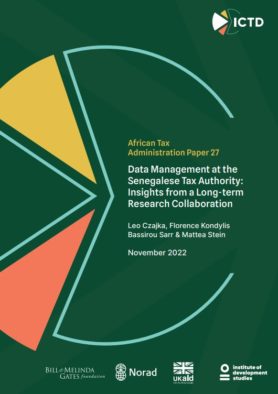African Tax Administration Paper 27
As they increasingly adopt digital infrastructure, public administrations worldwide are increasingly collecting, generating and managing data. Empirical researchers are, at the same time, collaborating more and more with administrations, accessing vast amounts of data, and setting new research agendas. These collaborations have taken place in low-income countries in particular, where administrative data can be a valuable substitute for scarce survey data. However, the transition to a full-fledged digital administration can be a long and difficult process, sharply contrasting the common leap-frog narrative. Based on observations made during a five-year research collaboration with the Senegalese tax administration, this qualitative case study discusses the main data management challenges the tax administration faces. Much progress has recently been made with the modernisation of the administration’s digital capacity ,and adoption of e-filling and e-payment systems. However, there remains substantial scope for the administration to enhance data management and improve its efficiency in performing basic tasks, such as the identification of active taxpayers or the detection of various forms of non-compliance. In particular, there needs to be sustained investment in human resources specifically trained in data analysis. Recently progress has been made through creating – in collaboration with the researchers – a ‘datalab’ that now works to improve processes to collect, clean, merge and use data to improve revenue mobilisation.
Acknowledgement from authors: We thank all members of the Direction Générale des Impôts et Domaines (DGID) who we have been working with. In particular we thank the Director, Mr Bassirou Samba Niasse, Deputy Director General Abdou Aziz Gueye, former general director, Mr Cheikh Ahmed Tidiane Bâ, Mr Mor Fall, Mr Serigne Mabeye Fall, Mr Amadou, Mr Abdoulaye Badiane, Mr Oumar Diop Diagne, the Director of the Intelligence department, Mr Cheikh Mouhamed Hady Dieye, the director of the IT department, Mrs Yama Kouyate Diaby, IT experts, Mr Oumar Ngom and Mr Mamadou Diangar, the director of the fiscal services directorate, Mr Lamine Sy, the director of the medium size taxpayer directorate, Mrs Ndeye Aïssatou Ndao, and the director of the large taxpayer directorate, Mr Abdoulaye Diagne. Mr Aliou Sow and Mr Mamadou Guisse also provided helpful administrative support over the years. And members, current or past, of the Cellule D’analyse et de Traitement des données (CTAD) : Mr Amadoune Sall, Mr Papa Mbacké Mbengue, Mr Ousseynou Ndiaye, Mr Papa Daouda Amad Diène, Mr Cheikh Ndiaye, Mrs Aïssatou Diop, Mrs Binta Sar, Mr Mouhamed Mboup, Mrs Dieynaba Sall, Mr Sadikh Dieye, Mrs Aminata Sow, Mr Mohammed Thiandoum. All errors are our own.

